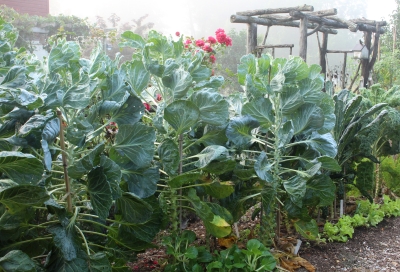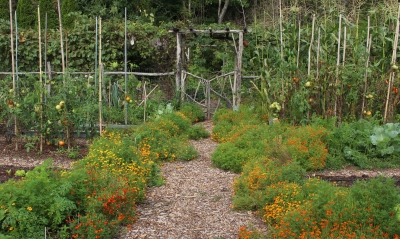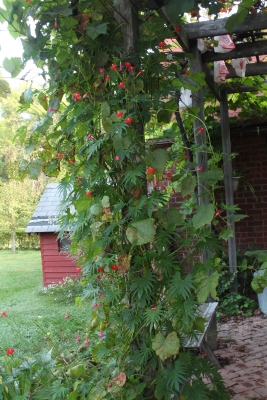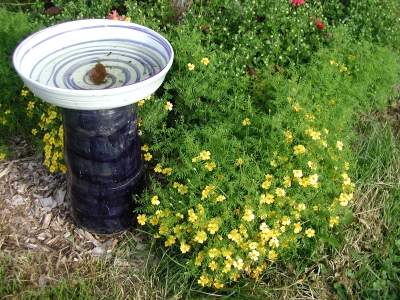Stand Up Straight!
I am particularly proud of my Brussels sprouts this year — and I haven’t even tasted them yet. How odd that I should be proud of this vegetable that I spurned in the past, often quoting a friend who referred to them as “little green balls of death.” Then I put my own twist on that description, saying that perhaps the friend meant that Brussels sprouts were only palatable a “little boiled to death.”
I’ve come around, and decided, a couple of years ago, that Brussels sprouts were worth growing, despite their high demands on space and time. For good production in northern climates, the seeds need to be sown indoors in early March, and then harvest doesn’t start until October or sometime after the first frost. And for all that waiting, each plant — a mere single stalk with whorls of leaves from top to bottom and a sprout at the base of each leaf — takes up an area of about three feet by three feet.

Gustas Brussels sprouts, standing up straight.
Things would be bad enough if a Brussels sprouts plant just grew straight up to fill its allotted area. But the plant can’t support itself, so in its youth it flops down on the ground. Once that supine stem has created a firm base upon which to rise, the end of the growing stem curves more or less upward according to original plan. That youthful waywardness wastes and muddies lowermost sprouts, with the sprawling plant demanding even more space, which is a problem in an intensively-planted garden.
This summer, before the plants even had time to consider flopping down, I poked a bamboo pole into the ground next to each one, which I tied to the pole, adding ties to keep up with growth. Perhaps a bit too orderly for a vegetable garden, but my Brussels sprouts “trees,” each now over four feet tall, look quite attractive.
The “trees” are not likely to grow much higher because I pinched out the top bud of each plant in early September. This pinching redirects the plants energy from the highest growing point to the side shoots — which are the sprouts. All month, the sprouts have been fattening, soon to be snapped off and eaten.
Not Your Average Marigold
I also count among this season’s successes two little-known flowers, both of which elicited “oohs and ahhs” from visitors here. One of the flowers were Signet marigolds. You might think, marigolds?, they’re okay, but more “ho hum” than “ooh and ahh.” Not so.
Signet marigolds, Tagetes tenuifolia, are a different species from common marigolds, and they look a little different. Mostly, they’re smaller, expanding into amorphous mounds of fine, lacy, lime-green leaves, from which stare out small yellow or orange blossoms — most charming. A lemony-marigold aroma wafts from both the blossoms and the leaves.
Actually, the aroma can waft over the whole garden if you plant enough Signet marigolds — which I did this year. In the past, the seeds never germinated very well for me, so I just spot planted what few seedlings I could raise here and there in the garden.
 This spring, in mid-April, I sowed the seeds densely in an 8 by 6 inch seed flat. The dense planting led to an excessive number of crowded seedlings. While they were still young, I gently lifted each one to transplant into its own potting-soil-filled cell to grow for a month or so before planting out in the garden.
This spring, in mid-April, I sowed the seeds densely in an 8 by 6 inch seed flat. The dense planting led to an excessive number of crowded seedlings. While they were still young, I gently lifted each one to transplant into its own potting-soil-filled cell to grow for a month or so before planting out in the garden.
The few plants I poked in at the feet of vegetable beds on either side of the main path through the vegetable garden have grown into sprawling mounds that wash into the main and side paths of the vegetable garden like seawater into an undulating beach. The flowing mounds effectively soften any excessive orderliness of the garden — from the soldier-straight Brussels sprouts plants, for example.
A Cardinal in our Midst
My grape arbor creates a horizontal roof nine feet above my terrace. Each of the four grape vines rises to that height on a single trunk. What an opportunity for a climbing vine, especially one that climbs by twining! My other floral success this year has been with such a twining plant, cardinal climber (Ipomoea x multifida, a hybrid created by mating I. coccinea and I. quamoclit).
In the past, other species of Ipomoea climbed those trunks. Morning glory was one, but that only blooms, of course, in the morning. Moonflowers have also dressed up the trunks, but they bloom only at night.
So this year, cardinal climber was the Impomoea species for the grape trunks. It blooms all day long, clothing itself in blossoms from top to bottom. The size and color of the blossoms, an inch or so across and cardinal red, seem best for relatively close viewing when sitting on the terrace.
No need for these flowers to soften any excessive orderliness of the arbor. The grape trunks wend their way skyward and their long, new shoots create plenty of disarray except right after they are pruned each spring.






